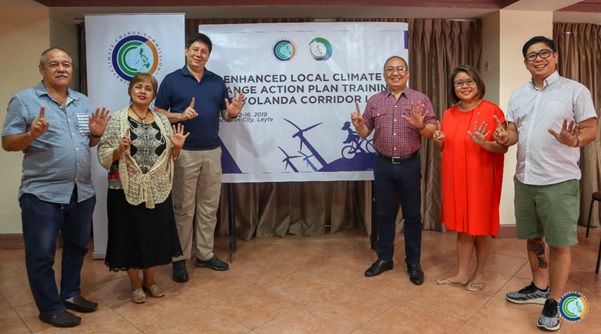
August 26, 2019 Monday

TACLOBAN CITY, LEYTE 27 August 2019 – Local government leaders of the Yolanda Corridor expressed their commitment to respond to the prevailing climate emergency during the Communities for Resilience (CORE) Modular Training Rollout held last August 12-16, 2019 at Tacloban City, Leyte.
Together with Climate Change Commission (CCC) Secretary Emmanuel De Guzman, Abuyog Mayor Lemuel Gin Traya, Dulag Mayor Mildred Joy Que, Tolosa Mayor Maria Ofelia Alcantara, and Tacloban City Mayor Alfred Romualdez signed the declaration entitled CORE Resolve of the Local Governments in the Yolanda Corridor to convey their resolve in ensuring an effective and collective response to the impacts of climate change in the country.
The local leaders, in particular, vowed to support the strengthening of cooperation between and among the national and local governments and the science and academic community on mainstreaming climate change in local development planning; scale up climate resilience-building efforts at the local community level; and enhance their Local Climate Change Action Plans to become more responsive to the prevailing and emerging needs of communities.
The CORE Modular Training Rollout is the CCC’s flagship capacity building program for local leaders and planners on mainstreaming climate change in local development and investment planning.
This year, CORE aims to give preferential attention to local communities in the Yolanda Corridor, to coastal communities more vulnerable to rising sea level and salt water intrusion, and to indigenous peoples whose resilience to extreme weather events are compromised by weak and vulnerable livelihoods.
“We only deem it fit to re-launch the CORE here in Tacloban, the ground zero of Yolanda. Tacloban, along with other cities and municipalities in the Yolanda corridor, showed us that climate change is no longer a mere specter on the horizon. It is happening now and it will only get worse with business as usual,” Secretary De Guzman said during the opening ceremony of the five-day training workshop.
Tolosa Mayor Maria Ofelia Alcantara, meanwhile, expressed their gratitude to the CCC for the CORE rollout in their region. “We are really happy na nandito ang Climate Change Commission kasi ang Tolosa is a small municipality with 15 barangays with 21,000 population. 88 percent of our land area is agriculture, and we have a 76-hectare protected marine sanctuary. But ngayon, because of climate change effects, it has really gone down kaya we want this na mas makagawa ng adaptation programs and interventions para maiwasan na natin ang paglala nito,” she said.
More than 39 representatives from the local government units of the Eastern Visayas Region, academic institutions, civil society organizations, and the private sector participated in the event, which included lectures on climate and disaster risk assessment process, greenhouse gas inventory, climate change expenditure tagging, and a workshop on project proposal development for the People’s Survival Fund (PSF).
With the goal of widening the scope of technical support to LGUs for accessing the PSF, the CCC also launched the PSF e-learning platform during the workshop.
The platform, which runs through an open source learning management system, enables the CCC to conduct a 12-week online course for LGUs and community organizations to enhance their knowledge on climate and disaster risk and vulnerability assessment, the PSF and its approval processes, and other sources of climate finance. There will be two batches per year, which will run from August-October and February-June.
Details of the PSF e-Learning Platform and Mentoring Session are available on the CCC website climate@gov.ph, PSF website psf@climate.gov.ph, and CCC’s Facebook and Twitter accounts. For inquiries, interested groups could contact the CCC-CCO PSF Unit at (02) 420-5513 or Telefax at (02) 420-5517, or via email at psf.ccc@gmail.com.